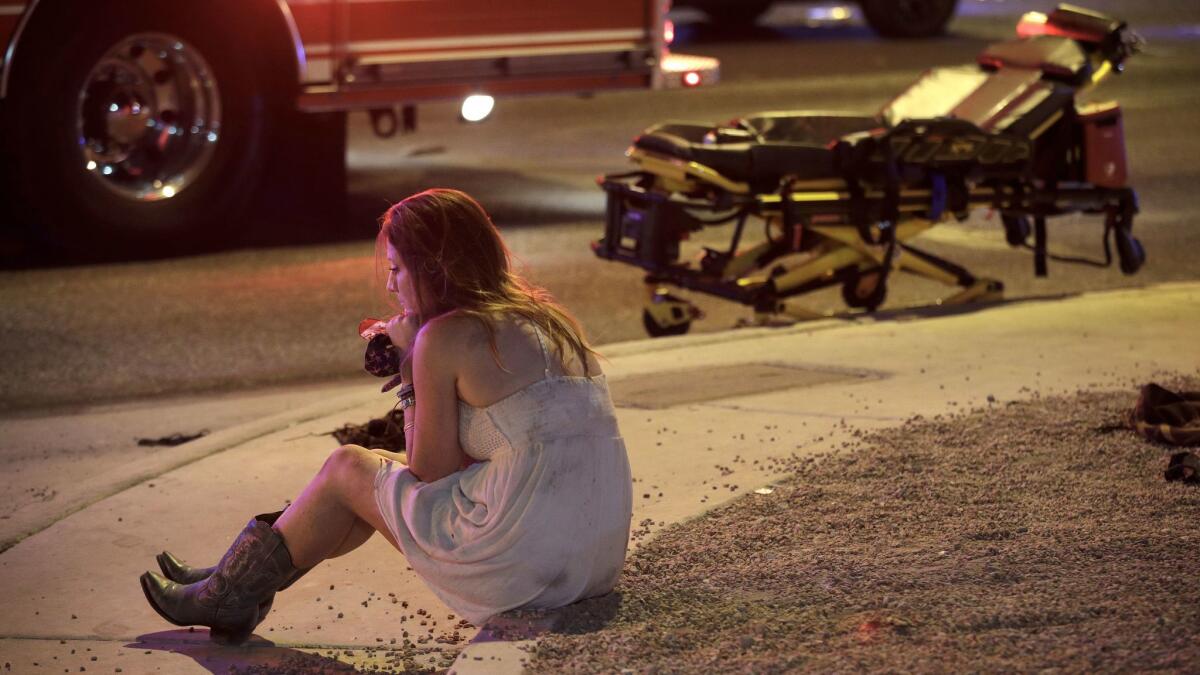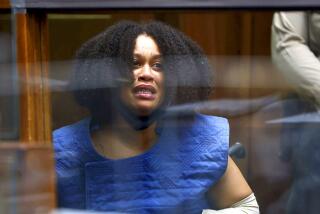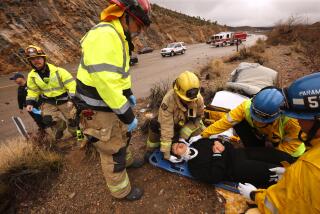She searched desperately for a man she helped after the Las Vegas shooting. Then she found him

The first time she ever met him, Sheri Sletten held him in her arms and pressed her cheek to his face.
“Can you feel this?” she asked.
For the record:
11:00 a.m. Nov. 3, 2017After this story was posted, the chief subject of the article, Sheri Sletten, told the Times that her account of reuniting with gunshot victim Matt Lewan after he was released from the hospital was false. That meeting did not occur. Lewan’s family says that while Sletten was present on the night Lewan was shot, Lewan’s father and a family friend administered the most important lifesaving aid.
“Yes,” he whispered.
“Then that means you’re alive,” she said.
Sletten had slid her hand up his shirtless back and felt the gaping wound caused by one of the hundreds of bullets fired from the 32nd floor of the Mandalay Bay hotel down into a crowd of 20,000 attending the Route 91 Harvest music festival.
She called for a cloth and was handed a bandanna. She shoved it into the wound to slow the bleeding. His eyes rolled back into his head and she helped load him onto a maintenance cart. He was whisked away.
She never got his name.
Her phone was lost. She helped some other people that had been shot — running on pure adrenaline — before eventually sitting down on a curb, blood on her dress and her cowboy boots. She felt lost that day and in the weeks after.
It’s been a month since the Oct. 1 shooting attack, when professional gambler and real estate investor Stephen Paddock opened fire out the window of the Mandalay Bay, killing 58 and wounding more than 500 — the largest mass shooting in modern American history.
Sletten left unharmed — as did thousands of others — but has struggled to get her life back on track. The 36-year-old spent the first few days after the shooting in bed with the television on 24 hours a day. Her husband and four children felt as though they were living with a ghost.
But Sletten was obsessed.
In her mind, she needed to know whether the man she had helped survived the shooting. The first few days, as names were released and pictures of the deceased were made public, she studied the faces. When she didn’t recognize him in any of the photos, she began to try and track down the names of the hundreds who were wounded.
She checked Facebook sites set up to reunite people. She called the hospitals in Las Vegas where the injured had been treated. But because of privacy laws, she couldn’t break through.
“I needed to know how he was doing,” she said. “I needed to know he was going to be OK.”
Sletten turned to Richard Peterson, a former Los Angeles County sheriff’s deputy who had retired a few years ago and did some private investigative work. She wondered whether he might be able to help her.
Peterson had already been contacted by a few others in Southern California looking to find out the status of the injured and was planning to do some work in Las Vegas anyway.
“I could tell she was desperate to find this man,” Peterson said. “It was clear to me that she needed this.”
Peterson spent three days trying to find out anything at all about the man. He struck out at hospitals, at the help centers set up for victims. Websites and phone banks set up to reconnect people produced no leads.
Finally, he called to tell her he’d come up empty.
“She was kind and nice to me, but I could tell the news left her feeling sad and devastated inside,” Peterson said. “I so badly wanted to give her good news.”
Sletten’s husband, Daniel, was worried. He said his wife was sleeping poorly, and she couldn’t stop watching the news — following every small development, scrutinizing and looking at photos and file footage to identify people in the background who might lead her to the man she helped.
It was like his wife was present, but also absent at the same time, he said. One night, some kids dumped rocks into a plastic pool next door and it sounded like gunfire to her. It took him hours to calm her down.
The family had been through struggles before. Daniel Sletten had battled cancer a few years earlier. Sheri Sletten had nearly died during the birth of her third child. But this one felt different. He felt helpless.
“Finding him was the biggest thing holding her back,” he said.
Sletten was trying to come back. She went back to work at the Murrieta Animal Hospital, where she was a receptionist.
But she looked like a different person, said Melissa Brand, one of the clinic’s registered veterinary technicians. When she got in that morning, the bubbly, outgoing personality had vanished. The rest of the staff moved in to help, answering calls from clients and checking in pets. Shortly after noon, Sletten went home.
“It was like her whole world had been turned upside down,” Brand said. “She was quiet and seemed overwhelmed. She was emotional and had this heavy weight on her.”
Then, almost two weeks after the shooting, Sletten read a story about those who had been injured during the attack and noted one who had the injury she was looking for: a shot in the back. There was a name: Matt Lewan.
Sletten began searching social media. Matt Lewan had a girlfriend whose face Sletten recognized from the concert. Then she identified his sister.
She messaged both of them and they remembered her. They filled her in. Lewan had been transported to three hospitals and had undergone several surgeries. The bullet was still lodged near his lung and couldn’t be removed. He’d suffered a broken arm when he fell.
Sletten wanted to see him, but she also wanted to wait until he was ready. She sent him a short text message, and he replied. Their exchanges were short, mostly Sletten asking him how he was feeling. They talked a little about the shooting. He remembered feeling her cheek on his, when she’d held him close.
Lewan was at UCI Medical Center in Orange but lived in Riverside County only about 30 minutes from where Sletten lives in Murrieta. She agreed to wait until he was stable enough to meet her.
It was supposed to happen about three weeks after the shooting, but Lewan had some complications and needed an emergency surgery. All the while, Sletten got updates from the family on his recovery.
On Thursday, Lewan phoned her from the hospital.
His voice was dry and cracked a little. He was ready. He was going to be released from the hospital Saturday. Did she want to come by his parents’ house?
Sletten awoke that morning feeling nervous. What if the meeting brought up all the worst memories of that night? She didn’t eat. She tried to keep busy with the kids and tidied up the house to pass the time. She was going to go with her husband, but decided it would be better if she went alone.
The drive felt as though it lasted forever, but then time collapsed. Tears were already in her eyes as she walked up to the door.
“I thought my knees might buckle at any second,” she said.
Lewan’s sister answered the door and the two embraced. Sletten made her way to the couch, where Lewan was. He smiled. For the first time in almost a month, she touched him and gave him a one-armed hug. In that moment, she felt alive.
Twitter: @davemontero
ALSO
Husband and wife who survived Las Vegas shooting die in car crash
Wounded casino security guard vanishes from Las Vegas — and surfaces on the set of ‘Ellen’
More to Read
Sign up for Essential California
The most important California stories and recommendations in your inbox every morning.
You may occasionally receive promotional content from the Los Angeles Times.











